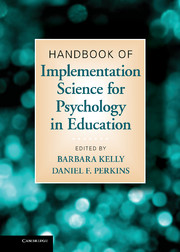Crossref Citations
This Book has been
cited by the following publications. This list is generated based on data provided by Crossref.
Bruder, Mary Beth
Dunst, Carl J.
Wilson, Cristina
and
Stayton, Vicki
2013.
Predictors of Confidence and Competence Among Early Childhood Interventionists.
Journal of Early Childhood Teacher Education,
Vol. 34,
Issue. 3,
p.
249.
Dunst, Carl J.
Trivette, Carol M.
and
Raab, Melinda
2013.
An Implementation Science Framework for Conceptualizing and Operationalizing Fidelity in Early Childhood Intervention Studies.
Journal of Early Intervention,
Vol. 35,
Issue. 2,
p.
85.
Dunsmuir, Sandra
and
Kratochwill, Thomas R.
2013.
From research to policy and practice: Perspectives from the UK and the US on psychologists as agents of change.
Educational and Child Psychology,
Vol. 30,
Issue. 3,
p.
60.
Schoenfeld, Naomi A.
Janney, Donna M.
and
Rekart, Jerome L.
2013.
Who is Writing? Author Affiliation across Peer-Reviewed Journals of Emotional or Behavioral Disorders, 2000–2011.
Behavioral Disorders,
Vol. 38,
Issue. 2,
p.
88.
Steins, Gisela
and
Haep, Anna
2014.
Soziales Lernen – Angewandte Sozialpsychologie für Lernende und Lehrende in Schule und Universität.
Gruppendynamik und Organisationsberatung,
Vol. 45,
Issue. 1,
p.
5.
Greenberg, Mark T.
and
Riggs, Nathaniel R.
2015.
Rutter's Child and Adolescent Psychiatry.
p.
215.
Conroy, Maureen A.
Sutherland, Kevin S.
Algina, James J.
Wilson, Reynolds E.
Martinez, Jose R.
and
Whalon, Kelly J.
2015.
Measuring Teacher Implementation of the BEST in CLASS Intervention Program and Corollary Child Outcomes.
Journal of Emotional and Behavioral Disorders,
Vol. 23,
Issue. 3,
p.
144.
Sullivan, Terri N.
Sutherland, Kevin S.
Farrell, Albert D.
and
Taylor, Katherine A.
2015.
Prevention Science in School Settings.
p.
201.
Dunst, Carl J.
and
Hamby, Deborah W.
2015.
Efficacy of Assistive Technology Interventions.
Vol. 1,
Issue. ,
p.
51.
Petrenko, Christie L. M.
2015.
Positive Behavioral Interventions and Family Support for Fetal Alcohol Spectrum Disorders.
Current Developmental Disorders Reports,
Vol. 2,
Issue. 3,
p.
199.
Goncy, Elizabeth A.
Sutherland, Kevin S.
Farrell, Albert D.
Sullivan, Terri N.
and
Doyle, Sarah T.
2015.
Measuring Teacher Implementation in Delivery of a Bullying Prevention Program: the Impact of Instructional and Procedural Adherence and Competence on Student Responsiveness.
Prevention Science,
Vol. 16,
Issue. 3,
p.
440.
Carl, J Dunst
Mary, Beth Bruder
and
Deborah, W Hamby
2015.
Metasynthesis of in-service professional development research: Features associated with positive educator and student outcomes.
Educational Research and Reviews,
Vol. 10,
Issue. 12,
p.
1731.
Ainsworth, Hannah
Hewitt, Catherine E.
Higgins, Steve
Wiggins, Andy
Torgerson, David J.
and
Torgerson, Carole J.
2015.
Sources of bias in outcome assessment in randomised controlled trials: a case study.
Educational Research and Evaluation,
Vol. 21,
Issue. 1,
p.
3.
Tracey Bywater, Dr
Kelly, Barbara
Edgerton, Carole
Graham, Seonaid
Robertson, Elaine
and
Syme, Barry
2015.
Parents and the Preschool PATHS (Promoting Alternative Thinking Strategies) curriculum.
Journal of Children's Services,
Vol. 10,
Issue. 3,
p.
231.
Randall, Leisa
Turner, Susannah
and
McLafferty, Lyn
2015.
A colourful dot on a dreary economic canvas: Building capacity for innovation in schools through the Coach Consult Programme.
Educational and Child Psychology,
Vol. 32,
Issue. 4,
p.
69.
Kearney, Maura
Williams, Fiona
and
Doherty, Fergal
2016.
Towards a nurturing city: Promoting positive relations across agencies.
Educational and Child Psychology,
Vol. 33,
Issue. 2,
p.
43.
Askell-Williams, Helen
2017.
Mental Health Promotion in Schools.
p.
141.
Taal, Margot
Ekels, Elles
van der Valk, Cindel
and
van der Molen, Maurits
2017.
Intervention integrity in the Low Countries: Interventions targeting social-emotional behaviors in the school.
International Journal of School & Educational Psychology,
Vol. 5,
Issue. 2,
p.
88.
Skrzypiec, Grace
Slee, Phillip
and
Askell-Williams, Helen
2017.
Mental Health Promotion in Schools.
p.
181.
March, Sam
and
Kearney, Maura
2017.
A psychological service contribution to nurture: Glasgow’s nurturing city.
Emotional and Behavioural Difficulties,
Vol. 22,
Issue. 3,
p.
237.



